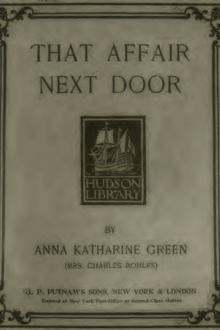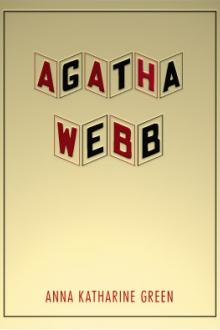The House of the Whispering Pines by Anna Katharine Green (best novels for beginners txt) 📕

- Author: Anna Katharine Green
- Performer: -
Book online «The House of the Whispering Pines by Anna Katharine Green (best novels for beginners txt) 📕». Author Anna Katharine Green
"As his counsel I have been able to extract from him a fact or two which he has hitherto withheld from the police. Reticent as he has shown himself from the start,—and considering the character of the two women involved in this tragedy, this cannot be looked upon as entirely to his discredit,—he has confided to me a circumstance, which in the excitement attendant on Miss Carmel Cumberland's sudden illness, may have escaped the notice of the family and very naturally, of the police. It is this:
"The ring which Miss Cumberland wore as the sign and seal of her engagement to him was not on her hand when he came upon her, as he declares he did, dead. It was there at dinner-time—a curious ring which I have often noted myself and could accurately describe if required. If she took it off before starting for The Whispering Pines, it should be easily found. But if she did not, what a clew it offers to her unknown assailant! Up till now, Mr. Ranelagh has been anticipating receiving this ring back in a letter, written before she left her home. But he has heard of no such letter, and doubts now if you have. May I ask if he is correct in this surmise?"
"We know of no such letter. None has come to his rooms," replied the coroner.
"I thought not. The whereabouts of this ring, then, is still to be determined. You will pardon my having called your attention to it. As Mr. Ranelagh's legal adviser, I am very anxious to have that ring found."
"We are glad to receive your suggestion," replied the district attorney. "But you must remember that some of its force is lost by its having originated with the accused."
"Very true; but Mr. Ranelagh was only induced to speak of this matter after I had worked with him for an hour. There is a mystery in his attitude which I, for one, have not yet fathomed. You must have noticed this also, Coroner Perry? Your inquest, when you hold it, will reveal some curious facts; but I doubt if it will reveal the secret underlying this man's reticence. That we shall have to discover for ourselves."
"He has another secret, then, than the one involving his arrest as a suspected murderer?" was the subtle conclusion of the district attorney.
"Yes, or why does he balk so at the simplest inquiries? I have my notion as to its nature; but I'm not here to express notions unless you call my almost unfounded belief in him a notion. What I want to present to you is fact, and fact which can be utilised."
"In the cause of your client!"
"Which is equally the cause of justice."
"Possibly. We'll search for the ring, Mr. Clifton."
"Meanwhile, will you cast your eye over these fragments of a note which Mr. Ranelagh says he received from Miss Carmel Cumberland while waiting on the station platform for her coming."
Taking an envelope from his pocket, Mr. Clifton drew forth two small scraps of soiled and crumpled paper, one of which was the half of another envelope presenting very nearly the following appearance:
As he pointed this out, he remarked:
"Elwood is not so common a baptismal name, that there can be any doubt as to the person addressed."
The other scraps, also written in pencil and by the same hand, contained but two or three disconnected words; but one of those words was Adelaide.
"I spent an hour and a half in the yards adjoining the station before I found those two bits," explained the young lawyer with a simple earnestness not displeasing to the two seasoned men he addressed. "One was in hiding under a stacked-up pile of outgoing freight, and the other I picked out of a cart of stuff which had been swept up in the early morning. I offer them in corroboration of Mr. Ranelagh's statement that the 'Come!' used in the partially consumed letter found in the clubhouse chimney was addressed to Miss Carmel Cumberland and not to Adelaide, and that the place of meeting suggested by this word was the station platform, and not the spot since made terrible by death."
"You are acquainted with Miss Carmel Cumberland's handwriting?"
"If I am not, the town is full of people who are. I believe these words to have been written by Carmel Cumberland."
Mr. Fox placed the pieces back in their envelope and laid the whole carefully away.
"For a second time we are obliged to you," said he.
"You can cancel the obligation," was the quick retort, "by discovering the identity of the man who in derby hat and a coat with a very high collar, left the grounds of The Whispering Pines just as Mr. Ranelagh drove into them. I have no facilities for the job, and no desire to undertake it."
He had endeavoured to speak naturally, if not with an off-hand air; but he failed somehow—else why the quick glance of startled inquiry which Dr. Perry sent him from under his rather shaggy eyebrows.
"Well, we'll undertake that, too," promised the district attorney.
"I can ask no more," returned Charles Clifton, arising to depart. "The confronting of that man with Ranelagh will cause the latter to unseal his lips. Before you have finished with my client, you will esteem him much more highly than you do now."
The district attorney smiled at what seemed the callow enthusiasm of a youthful lawyer; but the coroner who knew his district well, looked very thoughtfully down at the table before which he sat, and failed to raise his head until the young man had vanished from the room and his place had been taken by another of very different appearance and deportment. Then he roused himself and introduced the newcomer to the prosecuting attorney as Caleb Sweetwater, of the New York police department.
Caleb Sweetwater was no beauty. He was plain-featured to the point of ugliness; so plain-featured that not even his quick, whimsical smile could make his face agreeable to one who did not know his many valuable qualities. His receding chin and far too projecting nose were not likely to create a favourable impression on one ignorant of his cheerful, modest, winsome disposition; and the district attorney, after eyeing him for a moment with ill-concealed disfavour, abruptly suggested:
"You have brought some credentials with you, I hope."
"Here is a letter from one of the department. Mr. Gryce wrote it," he added, with just a touch of pride.
"The letter is all right," hastily remarked Dr. Perry on looking it over. "Mr. Sweetwater is commended to us as a man of sagacity and becoming reserve."
"Very good. To business, then. The sooner we get to work on this new theory, the better. Mr. Sweetwater, we have some doubts if the man we have in hand is the man we really want. But first, how much do you know about this case?"
"All that's in the papers."
"Nothing more?"
"Very little. I've not been in town above an hour."
"Are you known here?"
"I don't think so; it's my first visit this way."
"Then you are as ignorant of the people as they are of you. Well, that has its disadvantages."
"And its advantages, if you will permit me to say so, sir. I have no prejudices, no preconceived notions to struggle against. I can take persons as I find them; and if there is any deep family secret to unearth, it's mighty fortunate for a man to have nothing stand in the way of his own instincts. No likings, I mean—no leanings this way or that, for humane or other purely unprofessional reasons."
The eye of District Attorney Fox stole towards that of his brother official, but did not meet it. The coroner had turned his attention to the table again, and, while betraying no embarrassment, was not quite his usual self. The district attorney's hand stole to his chin, which he softly rubbed with his lean forefinger as he again addressed Sweetwater.
"This tragedy—the most lamentable which has ever occurred in this town—is really, and without exaggeration, a tragedy in high life. The lady who was strangled by a brute's clutch, was a woman of the highest culture and most estimable character. Her sister, who is supposed to have been the unconscious cause of the crime, is a young girl of blameless record. Of the man who was seen bending over the victim with his hands on her throat, we cannot speak so well. He has the faults and has lived the life of a social favourite. Gifted in many ways, and popular with both men and women, he has swung on his course with an easy disregard of the claims of others, which, while leaving its traces no doubt in many a humble and uncomplaining heart, did not attract notice to his inherent lack of principle, until the horrors of this tragedy lifted him into public view stripped of all his charms. He's an egotist, of the first water; there is no getting over that. But did he strangle the woman? He says not; that he was only following some extraordinary impulse of the moment in laying his thumbs on the marks he saw on Miss Cumberland's neck. A fantastic story—told too late, besides, for perfect credence, and not worthy of the least attention if—"
The reasons which followed are too well known to us for repetition. Sweetwater listened with snapping eyes to all that was said; and when he had been given the various clews indicating the presence of a third—and as yet unknown—party on the scene of crime, he rose excitedly to his feet and, declaring that it was a most promising case, begged permission to make his own investigations at The Whispering Pines, after which he would be quite ready to begin his search for the man in the derby hat and high coat-collar, whose love for wine was so great that he chose and carried off the two choicest bottles that the club-house contained.
"A hardy act for any man, gentleman or otherwise, who had just strangled the life out of a fine woman like that. If he exists and the whole story is not a pure fabrication of the entrapped Ranelagh, he shouldn't be hard to find. What do you say, gentlemen? He shouldn't be hard to find."
"We have not found him," emphasised the district attorney, with the shortest possible glance at the coroner's face.
"Then the field is all before me," smiled Sweetwater. "Wish me luck, gentlemen. It's a blind job, but that's just in my line. A map of the town, a few general instructions, and I'm off."
Mr. Fox turned towards the coroner, and opened his lips; but closed them again without speaking. Did Sweetwater notice this act of self-restraint? If he did, he failed to show it.
X "I CAN HELP YOU"A subtle knave; a finder out of occasions;
That has an eye can stamp and counterfeit
Advantages though true advantage never presents
Itself; A devilish knave!
Othello.
A half hour spent with Hexford in and about the club-house, and Sweetwater was ready for the road. As he made his way through the northern gate, he cast a quick look back at the long, low building he had just left, with its tall chimneys and rows of sightless windows, half hidden, half revealed by the encroaching pines. The mystery of the place fascinated him. To his awakened imagination, there was a breathless suggestion in it—a suggestion which it was his foremost wish, just now, to understand.
And those pines—gaunt, restless, communicative! ready with their secret, if one could only interpret their language. How their heads came together as their garrulous tongues repeated the tale, which would never grow old to them until age nipped their hoary heads and laid them low in the dust, with their horror half expressed, their gruesome tale unfinished.
"Witnesses of it all," commented the young detective as he watched the swaying boughs rising and dipping before a certain window. "They were peering into that room long before Clarke stole the glimpse which has undone the unfortunate Ranelagh. If I had their knowledge, I'd do something more than whisper."
Thus musing,





Comments (0)